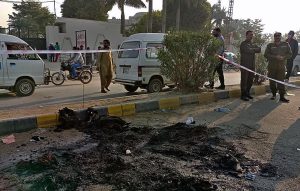Despair washed over Pakistan last week, leaving even the most optimistic amongst us in a state of hopelessness.
Priyantha Kumara, a Sri Lankan national who worked as a general manager at a local factory in Punjab’s Sialkot city, was tortured, murdered, and then set on fire by a mob that had accused him of blasphemy.
It later emerged that Kumara, who had been living and working in Pakistan for over a decade, had removed stickers of the far-right group, Tehreek-e-Labbaik Pakistan (TLP), from factory machinery before a visit from international clients. Some reports say he was killed over a dispute with factory workers.
The harrowing ordeal was documented, and captured the killers celebrating for sending a “blasphemer” to hell. Of all the visuals, one image stands out in particular as encapsulating the organized chaos that is the Pakistani state’s affair with religious extremism.
That image is of a young man taking a selfie in front of Kumara’s burning corpse. The back cover of his mobile phone is inscribed with Bollywood lyrics: “Apna Time Ayega” (Our time will come).
It certainly looks like his time is here.
What happened in Sialkot is a culmination of a fire lit decades ago, when a doctrinaire interpretation of faith was allowed to prosper in a politically driven move to legitimize religious intolerance.
Pakistan inherited blasphemy laws from its British colonizers, who introduced a decree in 1860 to control Hindu-Muslim clashes in the subcontinent. More than a century later, post-partition Prime Minister Zulfikar Ali Bhutto introduced a constitutional amendment declaring members of the Ahmadiyya sect as “non-Muslim” in a bid to woo the far-right. The laws were further strengthened during the military rule of Gen. Zia-ul Haq, who pursued an Islamization program to gain legitimacy for his power grab.
The blasphemy laws carry a potential death sentence for anyone who insults Islam.
While Bhutto may have lit the blaze, it has been kept alive by civilian leaders and military rulers alike, and the current hybrid regime is no different.
Interestingly, the mob violence took place a day after Prime Minister Imran Khan urged universities to research the “harmful effects of Western culture on the family system” – the latest in a series of efforts to intertwine religion with education.
The cricketer-turned-politician has long been an advocate of reconciliation with religious extremists and militants. He has initiated talks with mass murders with a clemency offer, even as he describes liberals as “scum of the country.” Ministers in the Khan government are considering treason charges against those opposing extremism.
To Khan’s credit, the government tried to ban the TLP and declare it a militant outfit over violent demonstrations in April demanding the expulsion of the French ambassador in Islamabad and the severing of trade tries with that country. However, the ban was subsequently lifted and the group’s leader, Saad Rizvi, released in October following a secret agreement between the government and the far-right organization, after deadly protests in Lahore killed at least six police officials.
With blasphemy as its principal plank, the TLP is readying itself for the upcoming general elections.
Where the Pakistani state has made rigorous efforts to mainstream the far-right into the political process, there is no clarity on the deradicalization of these parties.
A downside of allowing intolerance to go unchecked is the normalization of extrajudicial violence. Just days before the incident at Sialkot, a police station in Khyber Pakhtunkhwa province was set ablaze over officers’ refusal to hand over an accused blasphemer to a mob.
The fear around blasphemy cases means that even those in power are often too afraid to voice their disapproval. So, while the laws are often misused against religious minorities, this time the official condemnations were vehement because the mob lynched a foreign national of a friendly country.
Even so, both government and opposition carefully phrased their condemnations, with Khan using words such as “vigilante” while the leader of opposition conglomerate, Maulana Fazlur Rehman, said that mob violence was a result of the state’s failure to address blasphemy accusations.
The choice of words reflects attempts to avoid being perceived as a defender of an accused blasphemer – a label that no amount of religiosity can sustain. Salman Taseer, former Punjab governor, was shot and killed by his guard for exactly this transgression.













